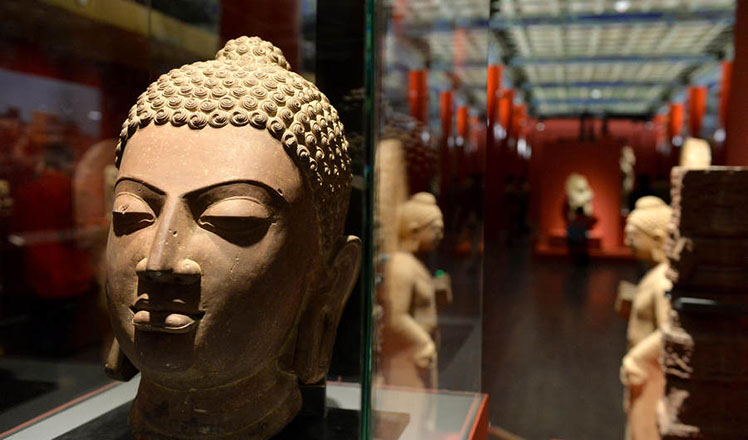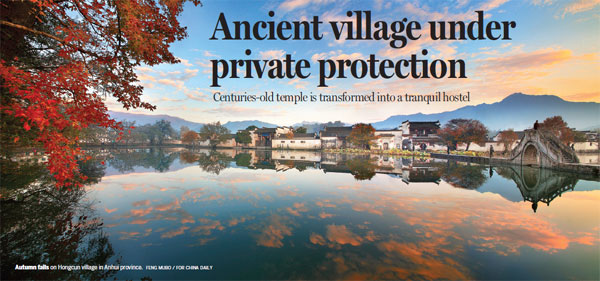Ancient village under private protection
Updated: 2016-10-05 07:50
By Zhu Lixin in Huangshan, Anhui Province(China Daily)
|
||||||||
Centuries-old temple is transformed into a tranquil hostel
Zhang Zhengyan sits in a delicately decorated room at his hostel, surrounded by a group of reporters who are here just for a short break after looking around Pingshan village on September 20.
Zhang, in his 60s, is an experienced film producer, who has produced 12 of the most famous films directed by Zhang Yimou, one of the most celebrated directors.
Although some guests were seen enjoying their drinks in the front hall, Zhang said the seven rooms in the hostel were all vacant on the day.
"It is likely because of the high prices, apart from the fact it is a work day today", said Zhang, whose hostel is an ancient house of some 1800 square meters. Zhang said a room in the hostel that is named the Imperial Bodyguard, costs nearly 1,000 yuan ($150) for a single day. He refuses to offer any discount even when sometimes there are no guests.
Pingshan of Yixian County is an ancient rural village in Huanshan city, which is known for the Huangshan Mountain, or the Yellow Mountain, in East China's Anhui province.
Although it was an ancient Huizhou-style building, the hostel, opened earlier this year, was not the original building on the site, but was reassembled with the components of similar ancient residences bought from the Huangshan region by Zhang in the last nine years.
Zhang said he runs the hostel not for money, "but mostly for fun, and the guests who share the same tastes with me are the most welcome".
On the site was originally a temple owned by the family of a high-level official surnamed Shu of the Qing Dynasty (1644-1911). "Out of restoration, the temple vanished about three decades ago", said Zhang.
The Shu family established the village in the Tang Dynasty (618-907). During the peak of the Ming Dynasty (1368-1644) and the Qing Dynasty, there were more than 400 houses and 18 family temples, while there are only about 200 houses and seven temples left.
Three years ago, Zhang acquired the land at a cost of 800,000 yuan, while reassembling the current house cost him almost 10 million yuan. The hostel building is just a fraction of what Zhang has bought and rebuilt in the last years.
In 2006, Zhang acquired some 66,700 square meters of land in the nearby Xiuli village of Yixian County, at a cost of 5 million yuan, to build a film base on the site. Building the base cost him tens of millions of yuan more, as he had bought more than 60 ancient buildings from the ancient Huizhou region and moved them to the place for reassembly and restoration.
In ancient times, the Huangshan region was called Huizhou Prefecture, which governed an urban area and six rural counties, including Yixian County.
"Huangshan city now has more than 8,000 ancient Huizhou-style houses, while only around 2,000 of the better-preserved ones have been listed as historic cultural relics by the government. The remainder are available for purchase, since the government is not able to protect so many ancient houses", said Wang Zefeng, party chief of Huangshan city.
Wang said it is because Huangshan is a mountainous region and was seldom disturbed by wars that the local ancient houses could be preserved much better than other areas of the country.
"This is reflected in the fact that the city enjoys a forestry coverage rate of more than 90 percent", added Wang.
Although some tycoons like Zhang choose to move the houses they buy to specific sites, most of the buyers are not able to afford the moving and reassembly process. So, they prefer to keep the building on their original sites and run their businesses after some restoration.
"The inside of most of the ancient houses is not suitable for living any more, so restoration and decoration inside the houses would be necessary", said Wang. He added that in this way the ancient house could be revived.
"The ancient buildings are only for sightseeing, but more importantly they should serve people's lives", said Wang.
Many of the buyers choose to run hostels, although only a fraction of them could match the delicacy of Zhang's.
"Take the Yixian County as an example, there are now approximately 10,000 hostels in the rural areas of the county, which has been a very popular tourism destination in the last few years", said Zhang.
Huangshan city attracts tens of millions of tourists every year, and local authorities estimate that more than 2 million of them will come from overseas this year.
Zhang sold the Xiuli film base to a capital fund company two years ago, as the value had appreciated to several times higher than his investment.
Now Zhang also owns seven ancient houses in the nearby Tachuan village, all operating as hostels, while it is the Imperial Bodyguard that he loves most.
"Maybe in the future I will close the hostel and take it as my family dwelling, since living in such a picturesque place with scattered ancient villages everywhere is pretty cool", said Zhang.
zhulixin@chinadaily.com.cn
|
Autumn falls on Hongcun village in Anhui province. Feng Mubo / For China Daily |

 Top 10 Chinese cities with 'internet plus transportation’
Top 10 Chinese cities with 'internet plus transportation’
 New energy cars shine at Paris Motor Show
New energy cars shine at Paris Motor Show
 23 baby giant pandas make debut in Chengdu
23 baby giant pandas make debut in Chengdu
 Heritage list salutes Chinese architecture
Heritage list salutes Chinese architecture
 Happy hour for prince and princess in Canada
Happy hour for prince and princess in Canada
 Chinese and Indian sculptures on display at the Palace Museum in Beijing
Chinese and Indian sculptures on display at the Palace Museum in Beijing
 Rescue work at the typhoon-hit provinces
Rescue work at the typhoon-hit provinces
 Wonderland-like sunrise in East China
Wonderland-like sunrise in East China
Most Viewed
Editor's Picks

|

|

|

|

|

|
Today's Top News
Trump outlines anti-terror plan, proposing extreme vetting for immigrants
Phelps puts spotlight on cupping
US launches airstrikes against IS targets in Libya's Sirte
Ministry slams US-Korean THAAD deployment
Two police officers shot at protest in Dallas
Abe's blame game reveals his policies failing to get results
Ending wildlife trafficking must be policy priority in Asia
Effects of supply-side reform take time to be seen
US Weekly

|

|









